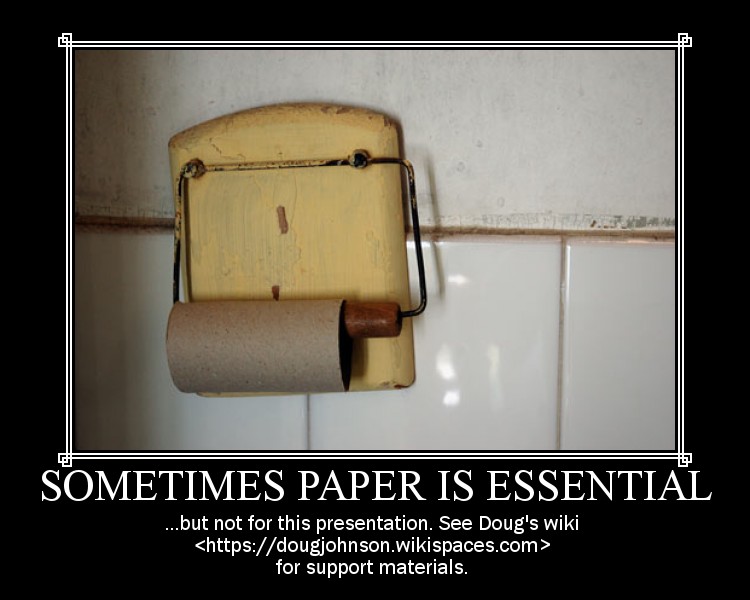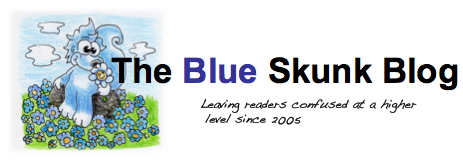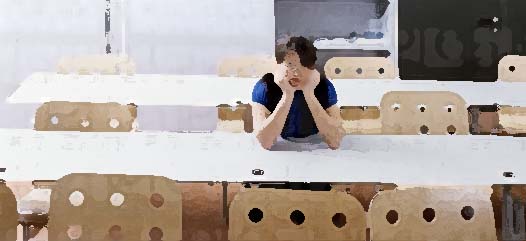A weekend Blue Skunk "feature" will be a revision of an old post. I'm calling this BFTP: Blast from the Past. Original post January 28th, 2007 but written even earlier (clay tablet as I remember). There are rumblings of certification for school technology directors. The observations below apply to us as well.
A colleague asked for a link to this old column that, as far as I remember, only appeared on my website and in my book, The Indispensable Librarian. I am republishing it here so I can find it more easily if it is ever requested again, and so that it has a Creative Commons designation.
How Important is Certification?, 1995.
There are plenty of assumptions about education being closely examined these days of tight budgets, public dissatisfaction with education, and changing work and citizenship skills. One issue which is frequently debated is whether library media specialists need to be certified.
Now I like the idea of certification for professionals in general. I am reassured by the Gothic-scripted piece of paper on my dentist's wall that he's had instruction in using the big needle coming toward me. It's good to know one's brain surgeon, airline pilot, and even barber possess a few minimum competencies.
dentist's wall that he's had instruction in using the big needle coming toward me. It's good to know one's brain surgeon, airline pilot, and even barber possess a few minimum competencies.
Yet I've gotten bad haircuts from licensed barbers, and good haircuts from self-trained stylists. And quite frankly I've known some certified media specialists that can turn kids off learning and libraries, and some paraprofessionals who are loved by kids, teachers and administrators for the terrific work they do.
How can this be? Perhaps we need to look back and see where and how professionals learn the critical skills they need to administer programs, serve clients, and make good decisions. I tend to divide the skills I bring to bear on my job into three major categories:
1) Technical skills
The majority of technical skills I have I learned on the job. I thank heaven that I had good practicum teachers, fellow media specialists, and especially savvy library clerks and technicians as instructors in these matters. These are skills like book shelving, filing, running the circulation system, processing materials, basic computer operations, network management, and day-to-day tasks of that nature. Not that I necessarily do these things - they are most often done by clerks and technicians - but I have learned them well enough to be able to make good policy decisions which are related to those tasks.
2) Professional skills
Curriculum design, budgeting, facilities planning, public relations, selection, policy making, professional writing, and intellectual freedom fighting are professional skills, and I took these concepts to heart as a graduate student in (do I dare say it?) an ALA library program. Probably these skills could also have been learned in a close mentor relationship with another professional librarian, but since many of us are the sole practitioner of our craft in our libraries, this seems largely impractical. Regardless of how they are acquired, no librarian can run a top-of-the-line program without a solid philosophical foundation!
Now one of the big troubles we have in our field is that there are plenty of "professionals" who chose not to use or exhibit these skills. We have too many crummy collections, dismal curricula, censors, and book-stamping reactionaries who hurt all of us. There is a theory in business that a patron who has a good experience with an organization will tell one other person; patrons who have bad experiences tell 8 other people. Do we need even one ineffective media specialist in our profession?
3) People skills
Now after just reading that diatribe, you are probably wondering what I am doing writing about people skills. They are, however, absolutely critical. The ability to communicate, lead, persuade, commiserate, empathize, encourage, delegate, inspire, compliment, build consensus, negotiate, finesse, apologize, and constructively criticize are what make us effective as both library media specialists and human beings. When our people skills are good enough, we are usually forgiven occasional lapses of technical or professional competence. When they are not present, we can know everything and do everything, but never be very effective.
Where do we acquire people skills? Our families and friends and spouses are the professors in this school of hard knocks. We are all born homo sapiens, but it takes a lifetime to become human. Formal education has almost nothing to do with people skills. I would say the percentage of jackasses among PhD's and high school dropouts is about the same. (Feel free to disagree.)
Do we need certification? Absolutely. Do we need certification which is meaningless because it does not guarantee professional competence or people skills? Absolutely not. It is critical we:
- raise entrance and graduation standards in our professional schools
- promote national professional competencies which include information technology competencies and human relations skills
- refuse to support or protect practicing media professionals who are incompetent, uncaring, or just plain lazy!
I have a son who I hope will lead a happy and productive life. I bring him with me as often as I can to workshops I teach, talks I give, meetings I coordinate - not to be babysat, but to work. At age nine, he is my gopher, my hauler, my phone answerer, my paper distributor - my teaching apprentice. He is paid with the satisfaction he gets from us working together and the occasional trip to McDonalds. As he gets older, his duties will increase. I hope by the time the boy is 18 he will not only have picked up the technical skills I use to teach and manage, but that he has also absorbed my professional values and learned some ways of effectively dealing with people.
 Wednesday, November 2, 2011 at 08:43AM
Wednesday, November 2, 2011 at 08:43AM 










Reader Comment
I prefer the term "credentialed". And, like any good credentials, it should be required that we periodically update it. But certification on a state level? Just not seeing it as needed.